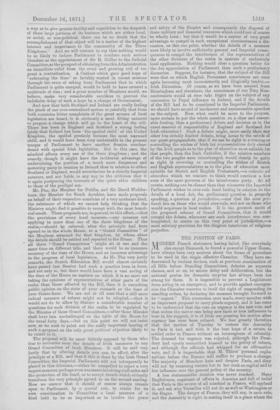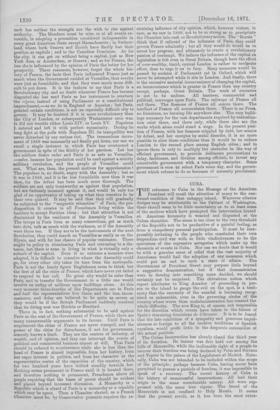THE POSITION OF PARIS.
ATODERN French statesmen having failed, like everybody il'JL else except Bismarck, to found a powerful Upper House, have always been very anxious about the forms of procedure to be used in the single effective Chamber. They have en- deavoured by various devices, such as previous examination of all Bills before Standing Committees, debates on separate clauses, and so on, to secure delay and deliberation, but the national genius for dramatic surprise has always been too strong for them. It is impossible to prevent a Legislature from acting in an emergency, and to provide against emergen- cies the Chamber reserves to itself the right of suspending its standing orders, by declaring the measure brought forward to be "urgent." This concession once made, every member with an important proposal to carry pleads urgency, and it has come to be understood that the vote on urgency is the test vote, and that unless the mover can bring new facts or new influences to bear in his support, it is of little use pressing his motion after urgency has once been refused. We fear greatly therefore that the motion of Tuesday to restore the Assembly to Paris is lost, and with it the best hope of a return to settled order in France without an interregnum of calamity. The demand for urgency was rejected, although the Presi- dent had openly committed himself to the policy of return, and although the officials had whipped for an affirmative vote, and it is improbable that M. Thiers personal expla- nations before the Bureau will suffice to produce a change. The majority of Members hate and despise Paris, and they will not by returning restore her to her rank as capital and to her influence over the general policy of the country.
A less statesmanlike decision was never reached. Many Englishmen, cognizant of affairs in America and full of belief that Paris is the source of all mischief in France, will applaud it, and ask why Versailles will not do as well as Washington or the Hague. The danger of France, they will say, is mob rule, and the Assembly is right in seating itself in a place where the
mob has neither the strength nor the wish to rise against authority. The Members must be wise, or at all events ex- cusable, in adopting a precaution considered indispensable in every great American State except Massachusetts ; in Switzer- land, where both Geneva and Zurich have finally lost their position as capitals ; and in the Canadian Dominion. As for the city, it can get on without being a capital, just as New York does, or Amsterdam, or Geneva ; and as for France, the less she is influenced by the opinion of Paris the better for her prosperity. These reasoners, however, forget the whole his- tory of France, the facts that Paris influenced France just as much when the Government resided at Versailles, that revolts were just as formidable, and that they were much more diffi- cult to put down. It is the fashion to say that Paris is a Revolutionary city, and no doubt whenever France has become disgusted she has used Paris as her instrument to overturn the re'ginte, instead of using Parliament or a constitutional impeachment,—as we do in England or America ; but Paris, granted certain conditions, is not an especially difficult city to govern. It may be doubted if it is more revolutionary than the City of London, or subsequently Westminster once was.
It did not trouble either Louis XIV. or Louis XV. Napoleon I. entered and left it with perfect equanimity. During its long fight at the polls with Napoleon III. its tranquillity was never disturbed by any serious riot. The tremendous move- ment of 1848 was summarily and finally put down, nor can we recall a single instance in which Paris has overturned a government in spite of the fidelity of her garrison. Let but the soldiers desire order and Paris is as safe as Versailles, —safer, because her population could be used against a strictly military revolution, and the people of Versailles could not. What are, then, the present motives for apprehension ?
The populace is, no doubt, angry with the Assembly ; but so it was in 1848, and it is far less formidable now than it was then, for the defeat has been much more thorough. The soldiers are not only trustworthy as against that population, but are furiously incensed against it, and would be only too glad of an opportunity of taking up what they conceive to be their own quarrel. It may be said that they will gradually be subjected to the "magnetic attraction " of Paris, the pre- disposition it creates in all Frenchmen living within the barriers to accept Parisian ideas ; but that attraction is not diminished by the residence of the Assembly in Versailles.
The troops in Paris form as many connections, get as much into debt, talk as much with the workmen, as if the Assembly were there too. If they are to he the instruments of the next Revolution, they could march on Versailles as easily as on the Elys6e, and with far less chance of popular resistance. There might be policy in abandoning Paris and retreating to a dis- tance, but there is none in living in what is virtually only a suburb of the capital. Even if so extreme a measure were adopted, it is difficult to conceive where the Assembly could go, for every other city takes its tone from the metropolis.
Paris is not the lonely figure Englishmen seem to think, but the first of all the cities of France, which have never yet failed to respond to her call. No great city would be safer than Paris, and to transfer the Government to a little one would involve an outlay of millions upon buildings alone. At this very moment three-fourths of the Departments are in Paris and half the representatives live there, and the loss, incon- venience, and delay are believed to be quite as severe as they would be if the British Parliament suddenly resolved that its fitting seat was Hitchin or Hertford.
There is, in fact, nothing substantial to he said against Paris as the seat of the Government of France, while there are many unanswerable arguments in its favour. Until Paris is acquiescent the cities of France are never tranquil, and the power of the cities for disturbance, if not for government, scarcely knows a limit. They are the centres of industry, of wealth, and of opinion, and they can interrupt the course of political and commercial business almost at will. That Paris should be reduced to acquiescence while she is less than the head of France is almost impossible, from her history, from her eager interest in politics, and from her character as the representative centre of the capacities of the country, which for two hundred years have drifted steadily towards her. Nothing seems permanent in France until it is located there, and therefore nothing is permanent, Frenchmen above all people requiring that the bases of power should be evident and placed beyond incessant discussion. A Monarchy or a Republic which is afraid of Paris is a monarchy or a republic which may be upset. Then a Chamber elected, as a French Chamber must be, by Conservative peasants requires the re- straining influence of city opinion, which, however violent, is sure, as we saw in 1848, not to be so strong as to precipitate the Chamber into rash or Revolutionary action. The "Rurals " think that if relieved of the influence of Paris, they could govern France admirably ; but all they would do would be to arrest her progress, and ultimately to create a revolutionary passion of contempt. We believe the influence of the capital on legislation is felt even in Great Britain, though here the effect of over-wealthy, timid, cynical London is rather to moderate effort, than to urge it on to fury. Many measures would be passed by acclaim if Parliament sat in Oxford, which will never be attempted while it sits in London. And finally, there is the excessive material inconvenience of changing the capital, an inconvenience which is greater in France than any country except, perhaps, Great Britain. The work of centuries is not to be undone. All business, commercial and political, converges upon Paris. The railways of France all end there. The finances of France all centre there. The intellect of France all accumulates there. There is no Press, no literature, no burning life anywhere else. The very build- ings necessary for the vast departments required by centraliza- tion exist there, and there only, while there also are the works which alone could stand a siege. In the present posi- tion of France, with her finances crippled by debt, her armies by defeat, and her energies by social disorder, it is no more possible to alter these conditions than it would be to reduce London to the second place among English cities ; and to ignore them is only to multiply the obstacles in the way of efficient government, to provide deliberate provocations to delay, feebleness, and division among officials, to invest any conceivable government with a temporary character. Some government is sure to select Paris some day, and the govern- ment which refuses to do so becomes of necessity provisional.











































 Previous page
Previous page